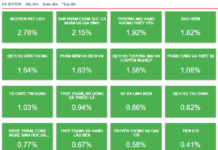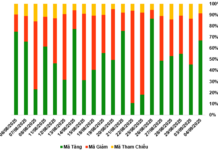The social housing segment is a hot topic that has been of great interest to the Government, experts, and businesses in recent times.
According to the project “Investment in the construction of at least 1 million social housing units for low-income people, industrial workers in the period 2021-2030”, by 2030, the total number of completed social housing units in localities is about 1,062,200 units. Specifically, in the period 2021-2025, about 428,000 units will be completed; in the period 2025-2030, about 634,200 units will be completed.
This year, the resolution of the Government requests the acceleration of the development of social housing and worker housing, striving to complete about 130,000 units. However, by December 2023, only about 46 projects had been completed (~ 20,210 social housing units), achieving 4.7% of the plan for the period 2021-2025, according to data from VnDirect.
Speaking about this issue at the 4th Spring Real Estate Forum, TS Vu Dinh Anh – an economist – stated: “I am not surprised that people who own cars buy houses because they can afford to buy social housing. Like in Germany, they only support rental housing, not homes for purchase. I suggest that we need to redefine social housing as 100% for rent, while we only allow 20% for rent.”

TS. Vu Dinh Anh, an economist, making a statement
The economist believes that the current social housing program is designed with a “buy-sell” mentality instead of for rent. What needs to be done is to clearly define the target social housing group based on their actual income rather than their nominal income. In addition, income distribution and the ability to pay of the target group must be considered.
Therefore, TS. Vu Dinh Anh proposes that social housing policies should focus on promoting construction for rent rather than for sale to meet the needs and affordability of the people.
“Without careful study, the strong development of social housing supply can lead to many consequences. Social housing construction businesses are facing the risk of selling to the wrong target group. And people who do not own homes do not have the ability to buy, and if they do buy, their lives will be more difficult because most of their income will go towards repaying loans. In this way, social housing policies burden the people,” emphasized TS. Vu Dinh Anh.
According to economist PGS. TS. Dinh Trong Thinh, the concept of affordable housing means low quality, resulting in many completed affordable housing projects that either cannot be sold or are not occupied. It is time to implement a systematic approach from conducting needs surveys to planning and providing preferential funding to support home buyers.
From a broader perspective, Phan Duc Hieu, a Permanent Member of the Economic Committee of the National Assembly, believes that in the development of social housing, multiple approaches and solutions should be adopted to ultimately provide support to the people. Social housing should be developed for both sale and rent, allowing those with the ability to buy to do so, while those without can rent.
Regarding access to capital, Phan Duc Hieu emphasized that the pilot project of accessing different land funds for the development of commercial housing will create a better mechanism for businesses to access land for housing development. In the Land Law, the State reclaims land for social housing development by businesses, which is more favorable for businesses than building commercial housing.
Discussing this issue further, economist TS. Nguyen Minh Phong believes that in 2024, the real estate market seems to have passed the “flood” stage of difficulties, but the recovery in different market segments is uneven. The brightest point is the promotion of social housing supply, with many projects starting construction and approved by investors.
“In 2024, it is estimated that 108 projects will be completed, providing 148,000 social housing units. This is an important highlight of the supply. The response from businesses is excellent. In addition, the Government’s stimulus to reduce interest rates for loans and improve access to social housing has also contributed to generating positive signals for the development of social housing in the coming time,” emphasized Phong.
Regarding the pilot policy of “different land” in the development of commercial housing, TS. Nguyen Minh Phong also agrees and believes that this regulation will increase the ability to access land for businesses to develop housing, but it needs to be piloted and focus more on the affordable housing and social housing segments.

Mr. Le Viet Hai – Chairman of Hoa Binh Construction Group presenting a speech.
From the perspective of construction contractors, Le Viet Hai, Chairman of the Board of Directors of Hoa Binh Construction Group, said that the challenge of social housing development in the recent period lies in the preferential treatment of the State in terms of land use tax, value-added tax, credit, and management costs that are not suitable for market rules, so there is still no consensus between the State and investors. Therefore, Hai proposed that there should be privileges for land use rights, value-added tax, and credit for investing businesses, in addition to boosting demand, which is the buyers.
“There have been social housing projects with a scale of 4 – 5 thousand units but they have not been absorbed because people who do not have homes have a need to buy but do not meet the conditions for buying social housing. When the products are not consumed, investors will not dare to invest confidently. Opening up supply but hindering demand will also stall,” emphasized Le Viet Hai.
Under the overall view, TS. Nguyen Minh Phong said that in 2024, the real estate market seems to have passed the “flood” stage of difficulties, but the recovery in different segments is uneven. The brightest point is the promotion of social housing supply, with many projects beginning construction and approved for investment.






![[Infographic] A Mid-Year Review: Banking Sector Performance in 2025](https://xe.today/wp-content/uploads/2025/09/info-ngan-hang-quy-2-218x150.jpg)

























